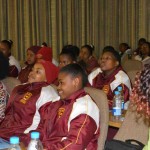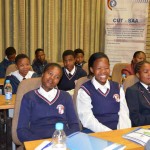“The best thing a man can do to correct the cultural injustice is to acknowledge that women are not subservient but equal to the task.” These were the words of Prof. Odireleng Martin Ntwaeaborwa, during his address at a public seminar on Women in Science, which was held on 12 August 2016. Prof. Odireleng Martin Ntwaeaborwa, is a researcher at the University of the Free State and President of South African Nanotechnology Initiative and a self-proclaimed feminist. The purpose of this event is to celebrate National Science Week and Woman in Science, an initiative by the department of science that aims to promote and honour woman in Science, Technology, Engineering, and Mathematics (STEM) within CUT.
Further, in his address to phenomenal women, Prof. Odireleng said that he is a proud feminist who relates to, and understands women and wishes that all men in science can become feminist and assist the government to successfully implement its initiatives to empower women. “For the past decades, women have made vast advancement in climbing the ladder and successfully building their careers in government and private sectors. We must be feminist and train them to become great scientists and engineers, not just secretaries and office managers,” he said. Prof. Ntwaeaborwa also presented on Nanoscience and Nanotechnology, which he said are studies and applications of tiny things that can be used across all the other science fields, such as chemistry, biology, physics, materials science, and engineering. He also highlighted that South Africa is the only country in Africa that is doing research in Nanoscience and Nanotechnology with the main focus on Health, Energy, and Water. He also mentioned that Nanoparticles could be used to harvest energy from the sun to improve the efficiency of solar panels and treat water in a cost effective manner by putting magnetic nanoparticles that cleanse water effectively while Nanomaterial can be used to detect and treat cancer at an early stage without any pain incurred.
Other women scientists in the faculties who presented include Dr Ntsoaki Malebo, Scientist and researcher in the Department of Life Sciences and her team, who shared their research experience on various issues such as health, indigenous knowledge and life sciences. Their work is a combination of medicinal plants and indigenous knowledge in searching for new drugs. They also use these plants to affirm the traditional healers’ information. Once the necessary information is acquired, the medicinal plants are tested at the lab for validation, evaluation, and development of plant products that are safe for human consumption.
Dr Lize Theron and her fellow researchers from the Faculty of Engineering and Information Technology spoke about women empowerment in the male-dominated environment of engineering, encouraging South African women to follow careers in engineering, as it is one of the identified scarce skills in the country. She also mentioned a vast scope of careers within the engineering field that woman could follow including research on water resources etc. “The burden of planet change and access to safe drinking water falls on women more than on men. The involvement of women in higher levels will thus make a lot of sense for them to be part of decision makers.”
Dr Wendy Setlalentoa, Head of the Department Maths, Science and Technology Education (MSTE) in the Faculty of Humanities and her team, focused on sustainable development in science and the importance of education thereof. She encouraged women to be passionate science educators. “The world cannot grow at good pace unless women come forward and take initiative for the development of this country. Education is a mother of all professions, without it we wouldn’t be having all the engineers and scientists that we see here today.”


Thandokazi Sigcu and Ayanda Feliti, grade 10 learners from Commtech high school said attending the seminar was an eye-opening experience for them and they were highly motivated and inspired by the work that women scientist are doing. “We are already in the science career field and we will take all this knowledge and challenges with us to turn things around for the women in our generation. The pressure will always be there but change is possible if you put your mind to it. We are just waiting for our time and space.”
Images
1: Prof. Odireleng Martin Ntwaeaborwa, a researcher at the University of the Free State and President of South African Nanotechnology Initiative was a guest speaker.
2: What has been common in Africa about the education of a girl child emanates from the famous proverb that says: when you educate a boy, you educate an individual, but when you educate a girl you are educating the whole nation or village. The grade 10-12 girl learners from Commtech and Tsoseletso high schools also attended the seminar to learn more about their future role in science and how they can turn things around to make South Africa a better place.
Uploaded: 16 August 2016
The post CUT celebrates National Science Week appeared first on CUT, South Africa.
